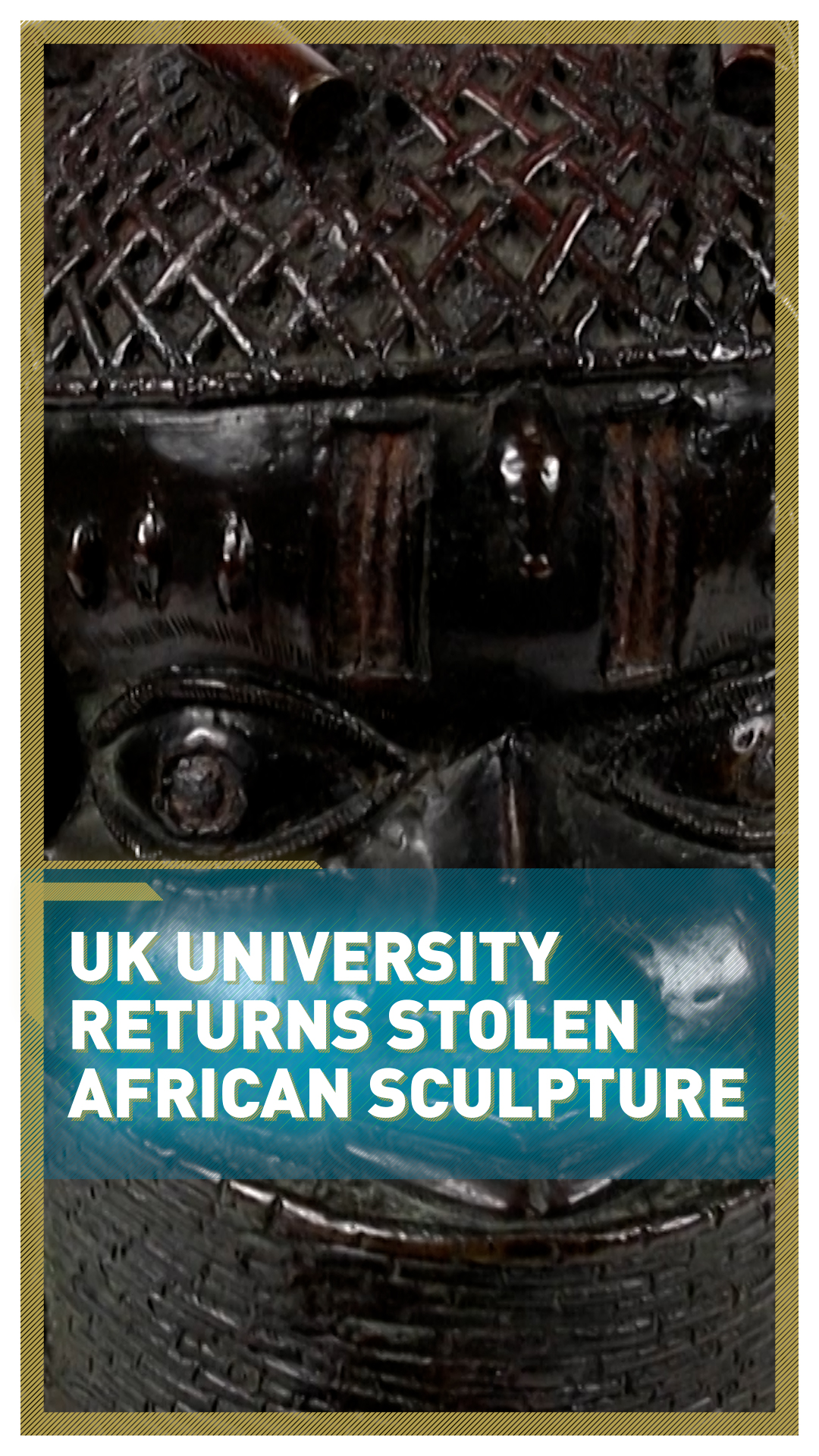02:28

A bronze sculpture depicting an 'Oba' or king of Benin, which was looted in the 19th century by British soldiers, will be returned to its home in Nigeria within weeks.
The University of Aberdeen, in Scotland, which acquired the sculpture at auction in 1957, said on Thursday that the artifact had left Nigeria in an "extremely immoral" fashion, prompting the university to reach out to authorities in 2019 to negotiate its return.
It was among thousands of metal and ivory sculptures, known as Benin Bronzes, which were looted by British forces in 1897 from the royal palace when an expedition attacked and destroyed Benin City, then capital of the Kingdom of Benin, located in present-day southern Nigeria. The works of art were then sold to collectors or museums around the Western world.

The looted sculpture depicting an Oba of Benin is to be returned to its home in Nigeria within weeks. /Kaylan Veera/University of Aberdeen/AFP
The looted sculpture depicting an Oba of Benin is to be returned to its home in Nigeria within weeks. /Kaylan Veera/University of Aberdeen/AFP
The university called it "one of the most notorious examples of the pillaging of cultural treasures associated with 19th century European colonial expansion."
"It would not have been right to have retained an item of such great cultural importance that was acquired in such reprehensible circumstances," said university vice-chancellor George Boyne.
"The next steps are the legal transfer of title, then the physical transfer" of the work, Neil Curtis, head of museums and special collections at Aberdeen University, told AFP. "We are starting to discuss with our Nigerian colleagues and with the Nigerian Embassy in London how this is going to be transferred physically, but I think it will happen in the next few weeks," he added.
Professor Abba Isa Tijani, director general of Nigeria's national commission for museums and monuments, said the importance of displaying the Bronze inside Nigeria for the first time in more than 120 years was inexpressible.
"It's part of our identity, part of our heritage... which has been taken away from us for many years," Tijani said.
The University of Aberdeen is one of the first institutions to agree to the full repatriation from a museum of a Benin Bronze, raising pressure on other establishments, including the British Museum, to follow suit.

The University of Aberdeen is one of the first UK institutions to fully repatriate a looted Benin Bronze back to its place of origin. /Kaylan Veera/University of Aberdeen/AFP
The University of Aberdeen is one of the first UK institutions to fully repatriate a looted Benin Bronze back to its place of origin. /Kaylan Veera/University of Aberdeen/AFP
Europe-wide call to return looted treasures
Lai Mohammed, Nigerian minister of information and culture, hailed the move "a step in the right direction," adding "other holders of Nigerian antiques should emulate this."
The university's announcement comes amid a current context of reflection in Europe among former colonial powers on the restitution of cultural treasures to the countries they had once colonized.
In recent days, Germany said it is negotiating the full restitution of 530 historical objects from the kingdom – including 440 Benin Bronzes considered the most important collection outside London's British Museum – in its museums, according to the Prussian Cultural Heritage Foundation (SPK), which manages the capital Berlin's museums.
Foreign Minister Heiko Maas said Germany was "working with those involved in Nigeria and in Germany" on the future of the objects, which he called "a question of justice."
"An honest approach to colonial history also includes the question of restitution of cultural assets," he said.
In France, late last year, a landmark move by the Senate approved the return of 27 pieces of looted African heritage, dating back to 1892, from the country's national collections to their places of origin in Benin and Senegal. The decision set a significant precedent for the return of all colonial-era loot from French national collections.

French politicians last year voted to approve a bill that would see looted artifacts from the French colonial era returned to their places of origin. /Michel Euler/AP Photo
French politicians last year voted to approve a bill that would see looted artifacts from the French colonial era returned to their places of origin. /Michel Euler/AP Photo
In 2019 in the UK, the University of Cambridge's Jesus College said it would return a Benin bronze of a cockerel that was taken down from display at the famous education establishment after a student protest. It has since finalized approvals in December for its return.
Pressure has now been mounting on the British Museum, which holds hundreds of bronzes, to follow suit and return the looted artifacts. The museum said it cannot legally give up possession of its artifacts, but has decided to loan certain works to Nigeria.
Nigeria plans to build a center to store and study the returned artifacts by the end of 2021, as well as a permanent museum to display the precious bronzes that have been returned . The future museum should emerge from the ground at the end of 2025 in the state of Edo, of which Benin City is the capital, from an initial funding of $4 billion, in which the British Museum and others are participating.
Artist and Edo state native Victor Ehikhamenor said he hoped the decision would prompt others to follow suit.
"Because some of these things are missing from our environment, people tend to like not able to contextualize where we are coming from because there is that tendency for western institutions and western critics to feel that after 1897, or after the colonial masters left our shores, no art ever came out from these shores," he told Reuters.

